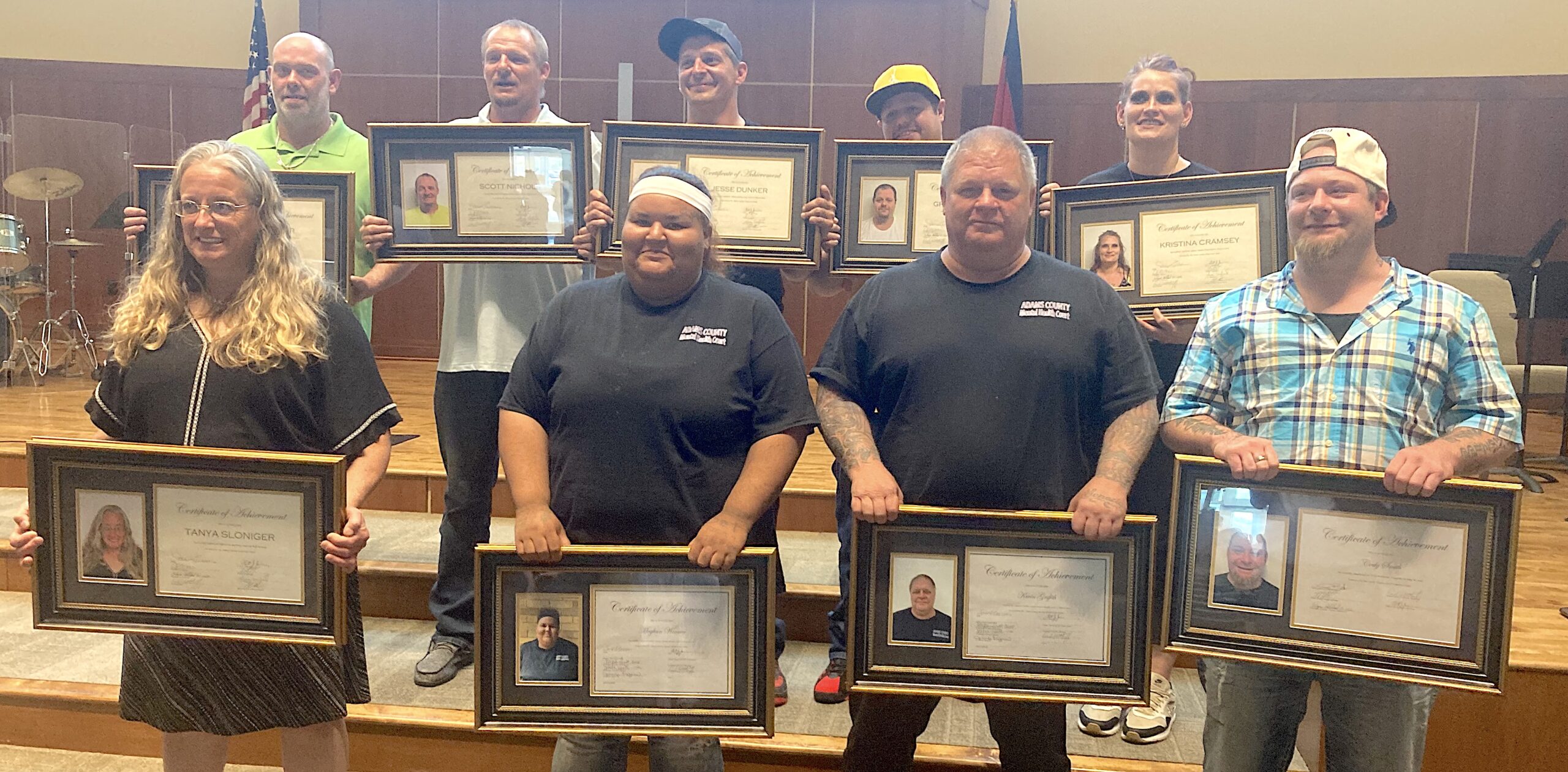‘You’re watching people really change their lives’: Wellborn presides over her last Problem-Solving Court graduation

QUINCY — Judge Debra Wellborn’s face creased with a smile as the nine graduates of Problem-Solving Court received their plaques Thursday afternoon in the Adams County Courthouse.
“The types of courtroom activities that we have, Drug Court can be the most heart wrenching from time to time, but it’s also been the most rewarding thing I’ve ever done,” she said.
Wellborn has presided over Problem-Solving Court since 2016, taking over for Judge Bill Mays after his retirement. Wellborn is set to retire in July of this year.
“You’re watching people really change their lives,” Wellborn says. “And it’s amazing. Sometimes they’re only doing it because they are dragged in the beginning to come in. And please, please, please … you almost beg people to do all of the right things. Then pretty soon you realize you’re not asking them to do them anymore. They’re just happy to do them themselves.”
Sometimes, the old ways of life return, and Wellborn must decide to send them back to prison.
“Sometimes that just has to happen when you kind of go off course enough that you’re not with us the way you should be,” Wellborn said.
Jesse Dunker was one of those who Wellborn threw back in prison. Five months into the program, he relapsed.
“I went out with some friends,” Dunker explained. “We were doing really good. But out of nowhere … the third rotation of a (methamphetamine) bowl went around, and I was like, ‘Wait a second. Did I hit that?” And they were like, yeah, you did.”
So why take another hit after the first?
“Because I’m a drug addict,” Dunker said. “I was like, ‘Oh, man, well, I guess I might as well just at least finish the bowl.’ Then after that bowl, it’s like, you can just do another bowl. I just let my brain talk myself into it.”
That night began an eight-day bender for Dunker. He lost 26 pounds and eventually found himself again in front of Wellborn, who sentenced him to 14 days in jail. He’s been sober since.
Dunker thanked her for that sentence on Thursday.
Dunker, 36, grew up in Pike County. He began drinking at age 16 and ran with the wrong crowd.
“My grandparents and my dad, they raised me right. Then once I got some freedom, I just wanted to rebel,” he said. “Dad wasn’t going to pick my friends. (In Pike County) there’s not much to do besides finding a cornfield, getting a big circle and starting a bonfire with a bunch of alcohol.”
Dunker found meth in his mid-20s. He eventually was homeless, living in Quincy out of a backpack while bouncing in and out of prison. He admits he has spent more than 1,000 days in jail.
Dunker faced a possible prison sentence of nearly 20 years in March 2022. He decided he had enough.
“I woke up one day, and I made a decision that today’s the day that I’m going to tell my public defender I want to counteroffer with a nine-and-a-half-year sentence,” Dunker said. “And I was OK with taking nine and a half years in prison. I was done with it. I was just so fed up. I just wanted to get this over with.”
As Dunker awaited sentencing, his probation officer asked if he had anything he could show the judge to help. He once had written a letter called “I’ve Been Here Before.” The officer showed it to Judge Amy Lannerd.
“The letter was about being in the revolving door of jail, streets, jail, streets … just going back and forth,” Dunker said. “The judge read it and she said, ‘Have I thought about asking for Problem-Solving Court?’”
He accepted despite previously failing Problem-Solving Court. At that time, he was on the outside and couldn’t handle the temptations from his friends.
Dunker now works full-time at a local trucking company and continues to work the program.
“It’s so easy to just block the world out with a bag of meth than to just face things,” he said.
The biggest challenge initially was living normally. His normal was not normal for so many years.
“I had just been so used to my unmanageability being manageable to me,” Dunker said. “So now when I’m becoming manageable, that seems in my brain unmanageable because it’s just everything everywhere, all at once.”
Thursday marked the 30th graduation class for Drug Court. Graduating with Dunker were Kristina Cramsey, Greg Massey, Scott Nichols, Tanya Sloniger, and Paul Wear.
Mental Health Court graduates were Meghan Winner and Kevin Griffith. Cody Smith graduated from the RISE Program.
Drug Court has been in existence nationally since 1989. Adams County adopted the program in 2006. Mental Health Court started in 2017 with the RISE Program starting in 2018. The three programs make up the County’s Problem-Solving Court.
Miss Clipping Out Stories to Save for Later?
Click the Purchase Story button below to order a print of this story. We will print it for you on matte photo paper to keep forever.

